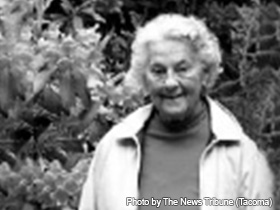You are here

9/3/1922 - 6/25/2013
A writer of historical nonfiction for children, Suzanne Hilton was a resident of Jenkintown, Pennsylvania.
Born in Pittsburgh in 1922, Suzanne Hilton moved to California at an early age, eventually returningto Pennsylvania and graduating from Arcadia University (formerly Beaver College). As an author of historical nonfiction books for children, Hilton researched diaries and letters from early America in developing the characters and environments of historical figures that were absent from textbooks. Among herhonors was a Golden Spur Award (1981). Hilton passed away on June 6, 2013.
Suzanne Hilton, born September 3, 1922, in Pittsburgh, was the daughter of Edwin P. (an insurance broker) and Helen (McFeely) McLean. Hilton traveled across the country with her parents to California when she was five-years-old, and she attended public school in Beverly Hills as well as a dozen other schools. She enrolled in the Pennsylvania College for Women (now Chatham College) from 1940 to 1943, earning her BA from Beaver College (now Arcadia University) in Glenside, Pennsylvania, in 1945. With her language specialties, Hilton volunteered at the Foreign Inquiry Department of the American Red Cross during World War II.
In June of 1945, she married industrial and insurance engineer Warren Mitchell Hilton, later a lieutenant colonel in the U.S. Army Reserves. Together they had two children, Edwin and Diana. Hilton then worked as a researcher and copywriter for the advertising department of Westminster Press in Philadelphia, and also as a researcher of local history. An ardent nature-lover, she and her family enjoyed camping and sailing throughout the Chesapeake Bay.
She is a member of the Author's Guild and the Philadelphia Children's Reading Round Table. How Do They Get Rid of It? (1970), about waste disposal, and How Do They Cope with It? (1971), about modern technology's approach to dealing with the forces of nature, were selected as books of the year by the Child Study Association. In 1975, the New York Times selected The Way It Was—1876 as one of their books of the year. She also won the Legion of Honor from the Chapel of Four Chaplains in 1978, an award for children's nonfiction from Drexel University and the Free Library of Philadelphia in 1979, and a Golden Spur Award from the Western Writers of America in 1981 for Getting There: Frontier Travel without Power.
The Way it Was—1876 discusses the American centennial and how people lived at the time, as well as their interests in the latest inventions like telephones and elevators. Gerald Carson of the New York Times writes that Hilton "does not go in heavily for interpretation of her data. However, she makes it abundantly clear to her young readers that in the centennial of the year 1876 Americans were highly pleased with their world and delighted with themselves. And she doesn't rub in that a century later we cannot so readily say the same." A Capital Capital City, 1790-1814 addresses the first 24 years of the city of Washington, DC. Chris Sherman of Booklist comments that Hilton's "lively style is backed by solid research, and that dynamite combination makes the book as entertaining as a good novel. It's filled with descriptions of the small matters of daily life and the personalities of the time—just the sort of wonderful details that breathe life into history."
Hilton has a particular approach in doing historical research for her nonfiction works for children readers. She tells Contemporary Authors Online that:
The people I write about really lived and still sound alive through their letters and diaries. I hope that my books can help spark young peoples' interest in what otherwise might be a dull task of memorizing dates. I have read several hundred diaries to pluck the most interesting tales written while the memory of an adventure was still ripe in the mind of the diary-writer...In just the same way, I find we can follow the young lives...of our early presidents. History text books always skipped through those early years—as if they were totally unimportant. I have used genealogy, diaries, and eyewitness stories to learn more about the world that Jefferson, Washington, Hoover, and Andrew Jackson grew up in. What better way to prove 'the child is father to the man?'
Suzanne Hilton currently resides in Jenkintown, Pennsylvania.
- How Do They Get Rid of It? Philadelphia: Westminster, 1970.
- How Do They Cope with It? Philadelphia: Westminster, 1970.
- It's Smart to Use a Dummy. Philadelphia: Westminster, 1971.
- It's a Model World. Philadelphia: Westminster, 1972.
- Beat It, Burn It, and Drown It. Philadelphia: Westminster, 1974.
- The Way it Was—1876. Philadelphia: Westminster, 1975.
- Who Do You Think You Are?: Digging for Your Family Roots. Philadelphia: Westminster, 1976.
- Here Today and Gone Tomorrow. Philadelphia: Westminster, 1978.
- Getting There: Frontier Travel without Power. Philadelphia: Westminster, 1980.
- We, the People: The Way We Were, 1783-1793. Philadelphia: Westminster, 1981.
- Faster than a Horse: Moving West with Engine Power. Philadelphia: Westminster, 1983.
- A Capital Capital City, 1790-1814. New York: Atheneum, 1992.
- Carson, Gerald. Rev. of The Way it Was—1876. New York Times 17 Aug. 1975: 211.
- Sherman, Chris. Rev. of A Capital Capital City, 1790-1814. Booklist 89.12 (15 Feb. 1993).
- "Suzanne Hilton." Contemporary Authors Online. 28 Aug. 2001. 9 Apr. 2007
Photo Credit: The News Tribune (Tacoma). "Photograph of Suzanne Hilton." 2013. Photograph. Cropped to 4x3, Filled background. Source: Online Resource.
